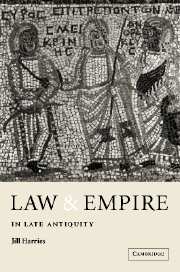Book contents
- Frontmatter
- Contents
- Preface
- Introduction
- 1 The law of Late Antiquity
- 2 Making the law
- 3 The construction of authority
- 4 The efficacy of law
- 5 In court
- 6 Crime and the problem of pain
- 7 Punishment
- 8 The corrupt judge
- 9 Dispute settlement I: out of court
- 10 Dispute settlement II: episcopalis audientia
- Conclusion
- Bibliography
- Index
6 - Crime and the problem of pain
Published online by Cambridge University Press: 22 September 2009
- Frontmatter
- Contents
- Preface
- Introduction
- 1 The law of Late Antiquity
- 2 Making the law
- 3 The construction of authority
- 4 The efficacy of law
- 5 In court
- 6 Crime and the problem of pain
- 7 Punishment
- 8 The corrupt judge
- 9 Dispute settlement I: out of court
- 10 Dispute settlement II: episcopalis audientia
- Conclusion
- Bibliography
- Index
Summary
The dark reputation of Late Antiquity as a period of cruelty and terror is based to a great extent on the operation, or abuse, of its criminal law. The severed heads of some usurpers and rebels went the rounds of the Empire as a warning to others and an ever more ghastly proof that the challenge was no more. Traitors, murderers, magicians and other criminals were routinely burned alive, the public floggings of slave and free inflicted both pain and social humiliation, judicial torture was extended up the social scale, innocents on remand rotted in prison, their cases unheard. All this provokes horror in the modern student of the time and general condemnation of the ‘judicial savagery’ of the age.
The harshness of the judicial climate in general, reinforced as it was by the menacing rhetoric of imperial laws, which routinely threatened the wicked with harsh penalties cannot be denied. In the language of the laws, emperors stand self-convicted of imposing terror on the citizens of the Empire, while their content reiterates the desirability of harsh punishments, and reveals the slow but sure erosion of the immunities of the better-off. From the pagans Libanius and Ammianus, as well as from the Christians Lactantius and Eusebius come harrowing accounts of oppression by ruthless judges, the ‘rack’, the ‘claws’ and the sadism of torturers.
- Type
- Chapter
- Information
- Law and Empire in Late Antiquity , pp. 118 - 134Publisher: Cambridge University PressPrint publication year: 1999

